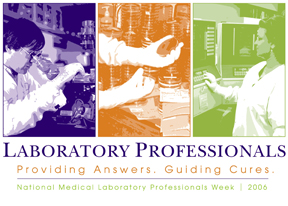 Clinical lab scientists perform tests, interpret results and provide answers for a complete picture of a patient’s health. They are vital members of the health care team since 70 percent of medical decisions are based on their lab results.
Clinical lab scientists perform tests, interpret results and provide answers for a complete picture of a patient’s health. They are vital members of the health care team since 70 percent of medical decisions are based on their lab results.
They also are in short supply.
National Medical Laboratory Professionals Week will be celebrated April 23-29. With a theme “Providing Answers. Guiding Cures,” the week will emphasize that laboratories are more about people than places and help spotlight the pending shortage of clinical laboratory professionals.
The average age of a clinical lab scientist or medical technologist is 48 years. Over half of the workforce will be retiring in the next 10 to 20 years. The Bureau of Labor Statistics estimates that 12,000 additional qualified lab professionals will be needed annually until 2010. The clinical lab science programs, however, are graduating only 4,200 new professionals annually.
If current trends continue, experts fear qualified staff will be overworked and unqualified people will be forced to help with the lab work. Complicating the problem is that more complex molecular testing is being developed requiring a highly skilled clinical lab scientist to run and interpret the results.
What is UNMC doing to help alleviate the shortage? UNMC’s Clinical Lab Science program is the only program in Nebraska. The program has 10 affiliate sites across Nebraska educating students in rural communities using distance education technology. The clinical lab science program also recently developed a new degree completion program for clinical licensed technicians. Medical laboratory technicians and clinical laboratory technicians interested in pursuing a bachelor’s degree in clinical laboratory science may apply to the new program.
A clinical lab scientist is involved in a variety of fields including hematology, blood banking, forensics, chemistry, microbiology, molecular diagnostics, immunology and urinalysis. As a result, they work in a broad range of places including hospitals, doctor’s offices, vet clinics, research lab, forensics, state health departments, blood banks and the Centers for Disease Control and Prevention.
Some of the notable lab achievements of UNMC’s clinical laboratory science employees include:
- Linda Fell, program director, has served on the board of directors of the American Society of Clinical Pathology (ASCP).
- Karen Honeycutt, assistant program director and education coordinator, serves on the American Society for Clinical Pathology Board of Registry committee.
- Mellissa Hellisgo, UNMC forensics, serves as the president of the Nebraska Society for Clinical Laboratory Science (NSLCS).
- Roxanne Alter, instructor, is the past president of NSCLS.
- Karen Keller, instructor, is treasurer of NSCLS.
- Janet Schmidt, recruiter and assistant instructor, is the first-year professional director of NSCLS.
- Sara McLaughlin, microbiology, is the student forum director of NSCLS.
- Sheri Kochendoerfer, laboratory, is the co-chair of the membership development committee of NSCLS.
On March 27-28, Fell, Hellisgo and Schmidt represented Nebraska at the Annual ASCLS-CLMA-ASCP Legislative Symposium in Washington D.C., where they learned of legislature affecting the lab. The group then lobbied on Capitol Hill to gain support to pass legislature to help alleviate the lab shortage and continue funding for clinical lab science programs. They also lobbied on Medicare reimbursement and competitive bidding.
Read more about Clinical Lab Science to www.ascls.org or www.ascp.org. Read more information about UNMC’s Clinical Lab Science Program.